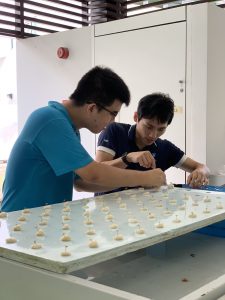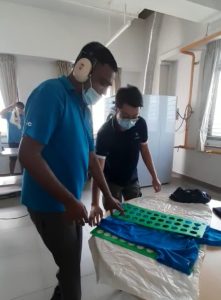 Coaches at our Day Activity Centres (DACs) spend six hours each day, five days a week, working closely with clients with moderate to severe autism. Being a DAC coach is an intensely engaging role. Beyond the requisite knowledge and skills, the ability to read situations. react quickly and respond appropriately is a daily reality for which a lot of understanding, patience and creativity are needed. And not forgetting that the role can be physically demanding too.
Coaches at our Day Activity Centres (DACs) spend six hours each day, five days a week, working closely with clients with moderate to severe autism. Being a DAC coach is an intensely engaging role. Beyond the requisite knowledge and skills, the ability to read situations. react quickly and respond appropriately is a daily reality for which a lot of understanding, patience and creativity are needed. And not forgetting that the role can be physically demanding too.
Let’s meet two of our coaches and find out why they choose to work with adults on the autism spectrum.
Going the Extra Mile
 Ansel, a coach at DAC (Siglap) since 2016, is often back at work during the DAC term breaks to fertilise the vegetables growing at SAAC’s Urban Farm and to check on the water and nutrient levels. Despite it being his break as well, he chooses to be back to ensure that there is no disruption to the horticulture programme for the clients. He says that the clients play a big role in maintaining the horticulture shed and urban farm. “They clean, germinate, transplant and harvest the vegetables based on a set timeline. If me putting in a bit of extra time helps bring them more meaning and joy in horticulture activities, I think it’s worth the time,” he elaborated.
Ansel, a coach at DAC (Siglap) since 2016, is often back at work during the DAC term breaks to fertilise the vegetables growing at SAAC’s Urban Farm and to check on the water and nutrient levels. Despite it being his break as well, he chooses to be back to ensure that there is no disruption to the horticulture programme for the clients. He says that the clients play a big role in maintaining the horticulture shed and urban farm. “They clean, germinate, transplant and harvest the vegetables based on a set timeline. If me putting in a bit of extra time helps bring them more meaning and joy in horticulture activities, I think it’s worth the time,” he elaborated.
Senior Coach Chloe, who works with Ansel and five other coaches in the DAC’s horticulture programme, recounted another example of how Ansel goes beyond what is expected of him to help his clients and their families. Clipping fingernails may sound like an easy task, but it can be very trying for parents of clients who are sensitive to touch and afraid of the nail clipper. It can take several days for coaches like Ansel to build up their clients’ trust and slowly trim and file the nails on all 10 fingers.
Choosing to Work with Adults on the Autism Spectrum
When asked why he chooses to be a DAC coach, Ansel said that while there are many programmes that provide intervention for children with special needs, including autism, there are far fewer services targeting adults on the autism spectrum. “This is a vulnerable group that is not well understood by the general public. My clients struggle daily to be accepted as part of society and understood by others. I work with them to better understand them and the challenges that they face. Ultimately, his reason for being a coach is, “If we wish to see change in society, we need to the ones that create that change.”
 Determination to Succeed Despite Constant Failure
Determination to Succeed Despite Constant Failure
Kee Jong, a coach at DAC (Sengkang), said he found 2018 a “rather challenging year”. He reflected: “When I decided to work in this field, I was prepared for the tough times ahead. But I was not prepared for the constant failures, and the ups and downs.” He strongly feels that anyone who wants to work in the special needs sector needs a lot of patience and perseverance. “To be honest, I doubted if I was really patient and determined enough to pull it off,” he shared.
Looking back, Kee Jong believes it was sheer will power, grit and a better understanding of autism and each of his clients individually that enabled him to survive what he refers to as the trial that this job gave him. “I would say that my passion to help others, in this case, the clients and their parents, is the driving force that keeps me going,” he added. He also looks for the little achievements and signs of progress in his clients and considers them worthy of celebration. This is why he highlights the importance of recognising successes, big and small, to their families and encourages them to continue to work together with the coaches in enabling their children to progress.
Selfless Service
 Also affectionately known as Coach KJ, Kee Jong’s love and passion for his job is displayed by him consistently placing the needs of his clients and their families above his own. He engages parents in conversations about their children’s progress, even after his work hours. Kee Jong is patient and offers a listening ear when his clients’ parents want to share the challenges, anxieties and frustrations they face. The DAC has received emails from parents commending Kee Jong’s selflessness in working with clients.
Also affectionately known as Coach KJ, Kee Jong’s love and passion for his job is displayed by him consistently placing the needs of his clients and their families above his own. He engages parents in conversations about their children’s progress, even after his work hours. Kee Jong is patient and offers a listening ear when his clients’ parents want to share the challenges, anxieties and frustrations they face. The DAC has received emails from parents commending Kee Jong’s selflessness in working with clients.
But Coach KJ doesn’t “switch off” his selflessness outside of the work place.
About six months ago, he was on his way to work when he noticed a commotion at the gantry at Punggol MRT Station. He saw that a mother was experiencing difficulty managing her special needs child, who was sitting on the floor refusing to go to school, inadvertently blocking access to the gantry. He offered his help without hesitation and was able to persuade the boy, who turned out to be an SAAS student, to move from the gantry. He eventually walked both the mother and student back to their block before making his way to work.
When confronted with the situation, he did not look the other way, nor was he was worried that he may be late for work. “My RO [reporting officer] and I have a respectful relationship and we trust each other. Moreover, I have the relevant knowledge and I understand autism, so I was more than ready to help,” he said. “And my RO understood the situation as I had updated him via text message as well.”
Unsung Heroes Deserve Gratitude
A few days after Singapore moved into Phase Two (Heightened Alert) and most individuals returned to working from home, all schools moved to full Home-Based Learning. But DACs continue to function onsite, which means DAC coaches still work with their clients in person six hours daily, five days a week.
We, at SAAC, are grateful for the dedicated coaches who continue to put their clients’ needs above their own, as they endeavour to enable adults on the autism spectrum live dignified and meaningful lives.






